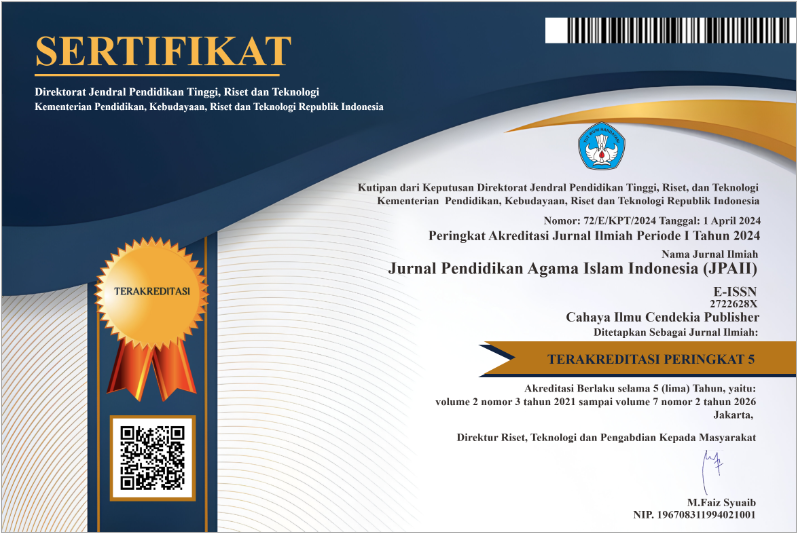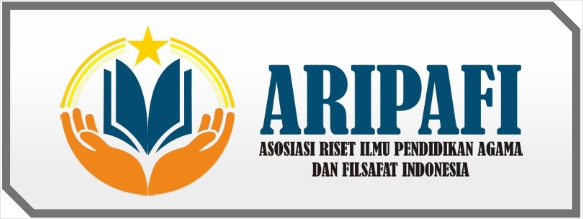The Relationship between Moral Education in the Family and Adolescent Personality
Abstract
Purpose of the study: This research aims to determine whether there is a relationship between moral education in the family and adolescent personality.
Methodology: This study uses questionnaire methods, documentation and data analysis methods. The subjects of the study were 40 respondents, using population and sample techniques (purposive random sampling). Data collection used a questionnaire instrument to collect x and y data. The collected research data were analyzed using descriptive statistical analysis techniques. Testing the research hypothesis used correlation analysis.
Main Findings: The results of the study showed that at the 5% level = 0.313. So that the comparison obtained based on the table of values obtained is: 0.219 <0.313 at a significant level of 5%. From the analysis of the data, the working hypothesis (Ha) which states that there is a significant relationship between moral education in the family and adolescent personality is rejected. At the 1% level = 0.405, the comparison obtained based on the table of values obtained is: 0.219 <0.405, then the null hypothesis (Ho) which states that there is no positive relationship between moral education in the family and adolescent personality so that Ho is accepted.
Novelty/Originality of this study: This study integrates moral education in the family as one of the determining factors in the formation of adolescent personality. Although many studies discuss moral education and adolescent development separately, this study offers a more comprehensive approach, considering how the family environment plays a direct role in shaping adolescent moral values and behavior.
References
A. Kafi, “Metode Pendidikan Akhlak Pada Santri Tajhizi Di Pondok Pesantren Al Falah Putera Banjarbaru,” DARRIS J. Pendidik. Madrasah Ibtidaiyah, vol. 5, no. 1, pp. 31–42, 2022, doi: 10.47732/darris.v5i1.424.
R. Ardiansyah, I. Irhamuddin, and S. Nasution, “Relevansi Penerapan Nilai-Nilai Pendidikan Perumahan Handayani Kota Binjai,” Andin. J. Ilm. Pendidik. Anak Usia Dini, vol. 1, no. 1, pp. 40–49, 2023. https://www.jurnal.stitawbinjai.ac.id/index.php/jat/article/view/21
N. Afif, A. N. Qowim, and A. Mukhtarom, “Pendidikan Akhlak Di Era Globalisasi Perspektif Buya Hamka,” Al Kamal, vol. 2, no. 1, p. 271, 2022. https://ejournal.staika.ac.id/index.php/alkamal/article/download/21/21
N. Nabila, “Tujuan Pendidikan Islam,” J. Pendidik. Indones., vol. 2, no. 5, pp. 867–875, 2021. doi: 10.59141/japendi.v2i05.170
M. E. Suharsongko, “Reformulasi Tujuan Pendidikan Islam,” J. Media dan Komun. Ilm., vol. 03, no. 02, pp. 108–121, 2021. https://jurnalstitmaa.org/index.php/alasma/article/view/57
A. A. Tambunan and H. Hafidz, “Nilai Pendidikan Anak dalam Buku Tarbiyatul Aulad Fil Islam Karya Dr. Abdullah Nashih ‘Ulwan,” Murhum J. Pendidik. Anak Usia Dini, vol. 5, no. 1, pp. 343–356, 2024, doi: 10.37985/murhum.v5i1.543.
Y. F. Ulfah, O. Ridhoi, and S. Sridadi, “Urgensi Keterlibatan Orang Tua Dalam Pembelajaran Daring Anak Ditinjau Dari Filsafat Pendidikan Anak Ibnu Sina,” Mamba’ul ’Ulum, vol. 18, no. 1, pp. 67–79, 2022, doi: 10.54090/mu.59.
Z. Abidin, “Penguatan Pribadi Muslim Siswa Melalui Pendidikan Akhlak Di Kelas Vi Mi Al Falah 1 Sumber Gayam Kadur Pamekasan,” Cogn. J. Pendidik. Dan Pembelajaran, vol. 1, no. 1, pp. 12–25, 2023. doi: 10.61743/cg.v1i1.9
I. Satria, “Cultivating Morals in the Formation of Behavior Student at MTsN 1 Bengkulu City,” Madania J. Kaji. Keislam., vol. 26, no. 2, p. 237, 2023, doi: 10.29300/madania.v26i2.8368.
B. Nudin, “Konsep Pendidikan Islam Pada Remaja di Era Disrupsi Dalam Mengatasi Krisis Moral,” LITERASI (Jurnal Ilmu Pendidikan), vol. 11, no. 1, p. 63, 2020, doi: 10.21927/literasi.2020.11(1).63-74.
Z. R. Izza and M. Huda, “Dampak Media Sosial bagi Kehidupan Perkawinan di Ponorogo,” J. Econ. Law, Humanit., vol. 1, no. 1, pp. 125–138, 2022, doi: 10.21154/jelhum.v1i1.528.
N. Nugraha and V. D. Pratiwi, “Peran Pendidikan Karakter Dalam Mengatasi Bullying Pada Remaja : Studi Kasus Di Smpit,” Cipulus EduJurnal Pendidik. Islam, vol. 2, no. 1, pp. 35–50, 2024. https://journal.albadar.ac.id/index.php/JPIcipulus/article/view/154
M. Mathibe, L. Cele, and P. Modjadji, “Alcohol Use among High School Learners in the Peri-Urban Areas, South Africa: A Descriptive Study on Accessibility, Motivations and Effects,” Children, vol. 9, no. 9, 2022, doi: 10.3390/children9091342.
L. T. Yakam, “Factors associated with alcohol consumption among students in Divine Word University , Madang Province , Papua New Guinea,” Contemp. PNG Stud., vol. 34, no. May, pp. 17–27, 2021. https://search.informit.org/doi/abs/10.3316/informit.356014514266745
M. N. Fuady, “The Urgence of Culturing Aqidah In Early Childhood Based on Hadith,” EDUTEC J. Educ. Technol., vol. 5, no. 1, pp. 161–170, 2021. https://ejournal.ijshs.org/index.php/edu/article/view/290
K. Sugimura, “Adolescent Identity Development in Japan,” Child Dev. Perspect., vol. 14, no. 2, pp. 71–77, 2020, doi: 10.1111/cdep.12359.
A. Hermino and I. Arifin, “Contextual character education for students in the senior high school,” Eur. J. Educ. Res., vol. 9, no. 3, pp. 1009–1023, 2020, doi: 10.12973/EU-JER.9.3.1009.
S. Sujarwo, E. Kusumawardani, I. Prasetyo, and H. Herwin, “Parent involvement in adolescents’ education: A case study of partnership models,” Cypriot J. Educ. Sci., vol. 16, no. 4, pp. 1563–1581, 2021, doi: 10.18844/cjes.v16i4.6013.
Y. Wibisono, “Konsep Pendidikan Islam dalam Membentuk Kecerdasan Spiritual Anak Di TAPAS (Taman Pembinaan Anak Sholeh Darul Qalam) Sedayulawas Brondong Lamongan,” J. Staika J. Penelit. dan Pendidik., vol. 4, no. 2, pp. 112–126, 2021. doi: 10.62750/staika.v4i2.44
W. C. Ningsih, S. Bela, and I. Ika, “Pendidikan Akhlak Remaja Dalam Keluarga Di Desa Mekarwangi Kecamatan Cisauk, Tangerang,” J. Konseling Pendidik. Islam, vol. 2, no. 1, pp. 188–202, 2021, doi: 10.32806/jkpi.v2i1.31.
F. Klara, S. Katja, and C. Erika, “‘Can we agree on that’? Plurality, power and language in participatory research,” Prev. Vet. Med., vol. 180, no. April, pp. 1–8, 2020, doi: 10.1016/j.prevetmed.2020.104991.
M. Al-Ababneh, “Linking ontology, epistemology and research methodology,” Sci. Philos., vol. 8, no. 1, pp. 75–91, 2020. https://papers.ssrn.com/sol3/papers.cfm?abstract_id=3708935
S. Dawadi, S. Shrestha, and R. A. Giri, “Mixed-methods research: A discussion on its types, challenges, and criticisms,” J. Pract. Stud. Educ., vol. 2, no. 2, pp. 25–36, 2021. doi: 10.46809/jpse.v2i2.20
J. Paul and M. Barari, “Meta-analysis and traditional systematic literature reviews—What, why, when, where, and how?,” Psychol. Mark., vol. 39, no. 6, pp. 1099–1115, 2022, doi: 10.1002/mar.21657.
S. Demir, “Comparison of Normality Tests in Terms of Sample Sizes under Different Skewness and Kurtosis Coefficients,” Int. J. Assess. Tools Educ., vol. 9, no. 2, pp. 397–409, 2022, doi: 10.21449/ijate.1101295.
H. Hernandez, “Testing for Normality: What is the Best Method?,” ForsChem Res., vol. 6, pp. 1–38, 2021, doi: 10.13140/RG.2.2.13926.14406.
R. Sugiarti, E. Erlangga, F. Suhariadi, M. V. I. Winta, and A. S. Pribadi, “The influence of parenting on building character in adolescents,” Heliyon, vol. 8, no. 5, 2022. doi: 10.1016/j.heliyon.2022.e09349
S. S. Batool and C. A. Lewis, “Does positive parenting predict pro-social behavior and friendship quality among adolescents? Emotional intelligence as a mediator,” Curr. Psychol., pp. 1–15, 2020. doi: 10.1007/s12144-020-00719-y
S. Gaskins, “Integrating cultural values through everyday experiences,” Oxford Handb. moral Dev., pp. 186–202, 2020.
E. Safitri, “Implementation of the development of moral religious values in early childhood through modeling methods,” Early Child. Res. J., vol. 5, no. 1, pp. 31–42, 2022. https://journals.ums.ac.id/index.php/ecrj/article/view/11858
D. Antoci, “Values and Emotions in Personality System of Adolescents and Youths,” in ATEE 2020-Winter Conference. Teacher Education for Promoting Well-Being in School. Suceava, 2020, Editura Lumen, Asociatia Lumen, 2021, pp. 1–26. https://www.ceeol.com/search/chapter-detail?id=979259
Copyright (c) 2024 Syamsul Arifin, Marwan Abuorabe, Omer Agail

This work is licensed under a Creative Commons Attribution 4.0 International License.
Authors who publish with this journal agree to the following terms:
- Authors retain copyright and acknowledge that the Jurnal Pendidikan Agama Islam Indonesia (JPAII) is the first publisher licensed under a Creative Commons Attribution 4.0 International License.
- Authors are able to enter into separate, additional contractual arrangements for the non-exclusive distribution of the journal's published version of the work (e.g., post it to an institutional repository or publish it in a book), with an acknowledgment of its initial publication in this journal.
- Authors are permitted and encouraged to post their work online (e.g., in institutional repositories or on their website) prior to and during the submission process, as it can lead to productive exchanges and earlier and greater citation of published work.







.png)
.png)





















